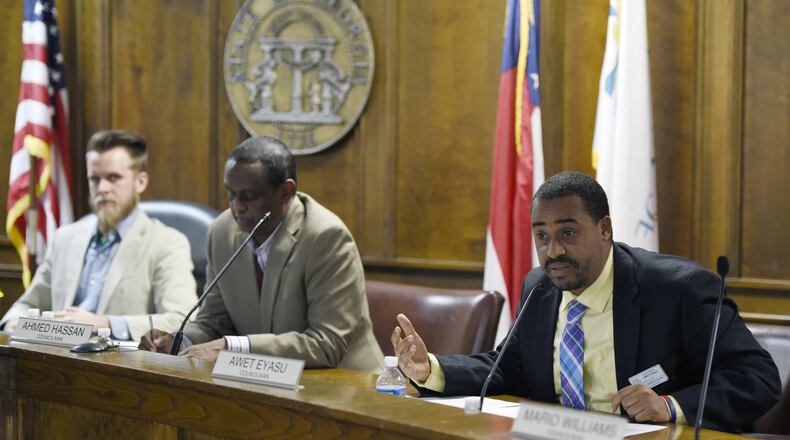Clarkston, a tiny haven in DeKalb County for newcomers from abroad, is weighing whether to limit cooperation with federal deportation officers amid the Trump administration's crackdown on illegal immigration. Activists are preparing to call on Clarkston's much bigger neighbor — Atlanta — to follow suit next week and adopt a similar policy.
The moves follow the highly-publicized arrests of scores of unauthorized immigrants across Georgia this year, including many Somali nationals in Clarkston this month. The discussions also come as President Donald Trump is seeking to strip federal funding from "sanctuary cities" that don't fully cooperate with U.S. Immigration and Customs Enforcement. On Tuesday, a federal judge in California temporarily blocked a key part of Trump's executive order that would withhold the money.
Proponents say restricting cooperation with ICE would make their communities safer by helping bring unauthorized immigrants out of the shadows.
“Clarkston wants to consider itself a city of refuge,” Clarkston Mayor Ted Terry said. “We want to make sure there is as much comfort with still interacting with the Clarkston police and not worrying about deportation.”
Immigration watchdogs say the rule of law, security and taxpayer dollars are at stake.
“Being a Georgia resident, I don’t want to see neighboring towns and communities enabling illegals who are breaking the law,” said Shawn Hanley, the vice chairman of Georgia’s Immigration Enforcement Review Board.
A Clarkston City Council committee is to discuss the issue Thursday night. A proposed policy backed by several immigrant rights groups would prohibit Clarkston authorities from detaining people after they would otherwise be released so they could be transferred to ICE’s custody.
At issue are ICE detainers, requests for jails to hold people for an additional 48 hours — excluding weekends and holidays — so the federal agency may pick them up and attempt to deport them. Critics point to federal court rulings that say jailing people based on ICE detainers can violate their constitutional rights. Clarkston’s proposed policy would prohibit complying with such requests, unless ICE presents a “judicially issued warrant.” An ICE spokesman said “judicially issued warrants” do not exist under civil immigration law, though he said his agency could provide administrative warrants to cities that request them.
Such a policy may be mostly symbolic for Clarkston. Here’s why: Clarkston Police Chief Christine Hudson said her small department has not received any ICE detainers since she took command in 2012. She added Clarkston police do not ask suspects about their legal residency status and do not operate a jail. Suspects, she said, are detained only briefly in one of the city’s two holding cells.
“They are not even there long enough where I have to feed anybody,” she said. “They are in there for a very minimal amount of time.”
ICE has repeatedly emphasized it is carrying out targeted arrests, not random raids. The Somali nationals who were arrested in Clarkston, according to ICE, had entered the country without authorization and have been ordered deported by federal immigration judges.
“We share the same overarching goal as our local partners – keeping our communities safe,” ICE spokesman Bryan Cox said. “ICE is focused first and foremost on criminals and other individuals who threaten public safety and national security. We are committed to working with our law enforcement partners to achieve that goal.”
The policy Clarkston is considering would not violate Georgia law, which bars rules that prohibit local authorities “from communicating or cooperating with federal officials or law enforcement officers with regard to reporting immigration status information,” according to a legal analysis provided to the city by several local immigrant support groups, including Women Watch Afrika.
“We have found out that in other areas where they have successfully implemented the non-detainer policy, it sort of brings back reassurance to the people and the communities feel safer,” said Glory Kilanko, director and CEO of Women Watch Afrika.
Meanwhile, immigrant rights activists are preparing to demonstrate in support of a similar policy outside of Atlanta City Hall Monday. They plan to make their case before Atlanta’s City Council later that day. Mayor Kasim Reed’s office had no immediate comment Wednesday.
“We have been urging the city (specifically the mayor’s office) to adopt this for a couple of years,” Azadeh Shahshahani, legal and advocacy director for Project South, an Atlanta immigrant rights advocacy group, said in an email. “Monday will be the first time that we will be appearing at a City Council hearing to urge the adoption of this policy.”
About the Author
Keep Reading
The Latest
Featured



